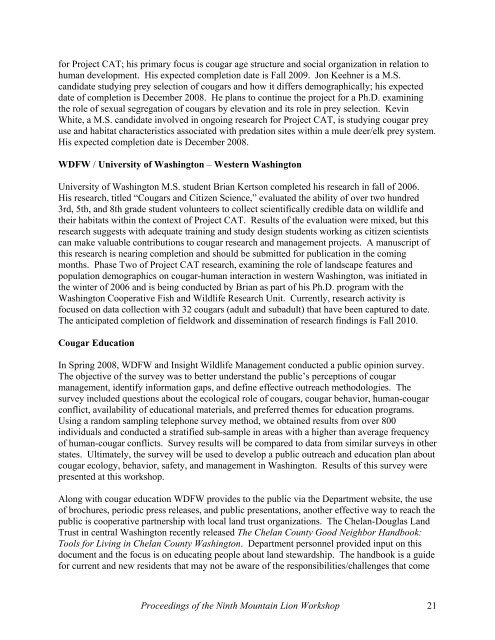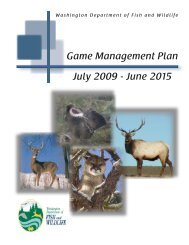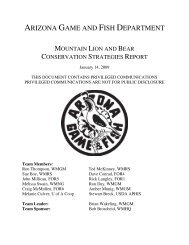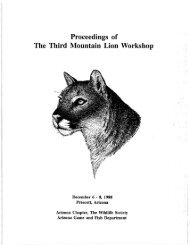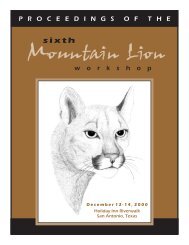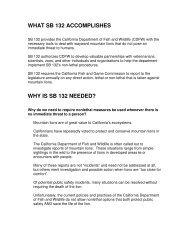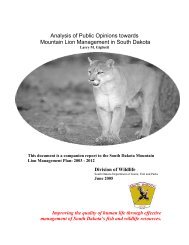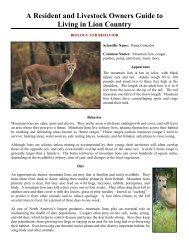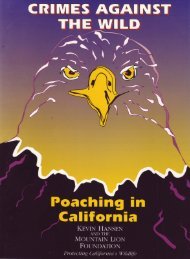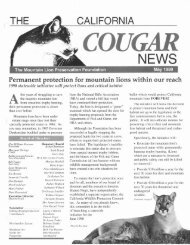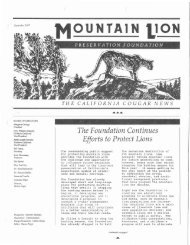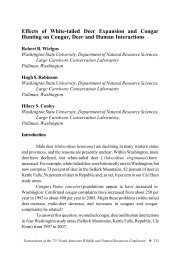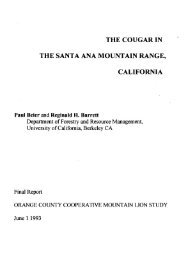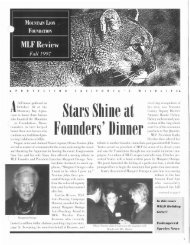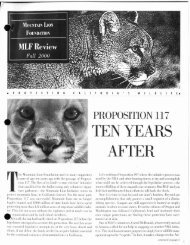Proceedings of the Ninth Mountain Lion Workshop - Carnivore ...
Proceedings of the Ninth Mountain Lion Workshop - Carnivore ...
Proceedings of the Ninth Mountain Lion Workshop - Carnivore ...
You also want an ePaper? Increase the reach of your titles
YUMPU automatically turns print PDFs into web optimized ePapers that Google loves.
for Project CAT; his primary focus is cougar age structure and social organization in relation to<br />
human development. His expected completion date is Fall 2009. Jon Keehner is a M.S.<br />
candidate studying prey selection <strong>of</strong> cougars and how it differs demographically; his expected<br />
date <strong>of</strong> completion is December 2008. He plans to continue <strong>the</strong> project for a Ph.D. examining<br />
<strong>the</strong> role <strong>of</strong> sexual segregation <strong>of</strong> cougars by elevation and its role in prey selection. Kevin<br />
White, a M.S. candidate involved in ongoing research for Project CAT, is studying cougar prey<br />
use and habitat characteristics associated with predation sites within a mule deer/elk prey system.<br />
His expected completion date is December 2008.<br />
WDFW / University <strong>of</strong> Washington – Western Washington<br />
University <strong>of</strong> Washington M.S. student Brian Kertson completed his research in fall <strong>of</strong> 2006.<br />
His research, titled “Cougars and Citizen Science,” evaluated <strong>the</strong> ability <strong>of</strong> over two hundred<br />
3rd, 5th, and 8th grade student volunteers to collect scientifically credible data on wildlife and<br />
<strong>the</strong>ir habitats within <strong>the</strong> context <strong>of</strong> Project CAT. Results <strong>of</strong> <strong>the</strong> evaluation were mixed, but this<br />
research suggests with adequate training and study design students working as citizen scientists<br />
can make valuable contributions to cougar research and management projects. A manuscript <strong>of</strong><br />
this research is nearing completion and should be submitted for publication in <strong>the</strong> coming<br />
months. Phase Two <strong>of</strong> Project CAT research, examining <strong>the</strong> role <strong>of</strong> landscape features and<br />
population demographics on cougar-human interaction in western Washington, was initiated in<br />
<strong>the</strong> winter <strong>of</strong> 2006 and is being conducted by Brian as part <strong>of</strong> his Ph.D. program with <strong>the</strong><br />
Washington Cooperative Fish and Wildlife Research Unit. Currently, research activity is<br />
focused on data collection with 32 cougars (adult and subadult) that have been captured to date.<br />
The anticipated completion <strong>of</strong> fieldwork and dissemination <strong>of</strong> research findings is Fall 2010.<br />
Cougar Education<br />
In Spring 2008, WDFW and Insight Wildlife Management conducted a public opinion survey.<br />
The objective <strong>of</strong> <strong>the</strong> survey was to better understand <strong>the</strong> public’s perceptions <strong>of</strong> cougar<br />
management, identify information gaps, and define effective outreach methodologies. The<br />
survey included questions about <strong>the</strong> ecological role <strong>of</strong> cougars, cougar behavior, human-cougar<br />
conflict, availability <strong>of</strong> educational materials, and preferred <strong>the</strong>mes for education programs.<br />
Using a random sampling telephone survey method, we obtained results from over 800<br />
individuals and conducted a stratified sub-sample in areas with a higher than average frequency<br />
<strong>of</strong> human-cougar conflicts. Survey results will be compared to data from similar surveys in o<strong>the</strong>r<br />
states. Ultimately, <strong>the</strong> survey will be used to develop a public outreach and education plan about<br />
cougar ecology, behavior, safety, and management in Washington. Results <strong>of</strong> this survey were<br />
presented at this workshop.<br />
Along with cougar education WDFW provides to <strong>the</strong> public via <strong>the</strong> Department website, <strong>the</strong> use<br />
<strong>of</strong> brochures, periodic press releases, and public presentations, ano<strong>the</strong>r effective way to reach <strong>the</strong><br />
public is cooperative partnership with local land trust organizations. The Chelan-Douglas Land<br />
Trust in central Washington recently released The Chelan County Good Neighbor Handbook:<br />
Tools for Living in Chelan County Washington. Department personnel provided input on this<br />
document and <strong>the</strong> focus is on educating people about land stewardship. The handbook is a guide<br />
for current and new residents that may not be aware <strong>of</strong> <strong>the</strong> responsibilities/challenges that come<br />
<strong>Proceedings</strong> <strong>of</strong> <strong>the</strong> <strong>Ninth</strong> <strong>Mountain</strong> <strong>Lion</strong> <strong>Workshop</strong> 21


